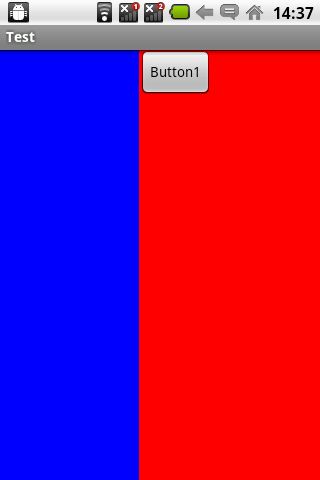提取Launcher中的WorkSapce,可以左右滑动切换屏幕页面的类
提取Launcher中的WorkSapce,可以左右滑动切换屏幕页面的类
By:Yao.GUET 转载请注明出处。
http://blog.csdn.net/Yao_GUET
对于Launcher的桌面滑动大家应该都比较熟悉了,最好的体验应该是可以随着手指的滑动而显示不同位置的桌面,
比一般用ViewFlinger+动画所实现的手势切换页面感觉良好多了~~~~
分析了一下Launcher中的WorkSpace,里面有太多的代码我们用不上了(拖拽,长按,,,),把里面的冗余代码去掉得到实现滑动切换屏幕所必需的。。。。
新建一个ScrollLayout类,继承自ViewGroup。
重写onMeasure和onLayout两个方法:
其中onMeasure方法中,得到ScrollLayout的布局方式(一般使用FILL_PARENT),然后再枚举其中所有的子view,设置它们的布局(FILL_PARENT),这样在ScrollLayout之中的每一个子view即为充满屏幕可以滑动显示的其中一页。
在onLayout方法中,横向画出每一个子view,这样所得到的view的高与屏幕高一致,宽度为getChildCount()-1个屏幕宽度的view。
添加一个Scroller来平滑过渡各个页面之间的切换,
重写onInterceptTouchEvent和onTouchEvent来响应手指按下划动时所需要捕获的消息,例如划动的速度,划动的距离等。再配合使用scrollBy (int x, int y)方法得到慢速滑动小距离的时候,所需要显示的内容。最后当手指起来时,根据划动的速度与跨度来判断是向左滑动一页还是向右滑动一页,确保每次用户操作结束之后显示的都是整体的一个子view.
ScrollLayout源码:
package com.yao_guet.test;
import android.content.Context;
import android.graphics.Canvas;
import android.util.AttributeSet;
import android.util.Log;
import android.view.MotionEvent;
import android.view.VelocityTracker;
import android.view.View;
import android.view.ViewConfiguration;
import android.view.ViewGroup;
import android.widget.Scroller;
/**
* 仿Launcher中的WorkSapce,可以左右滑动切换屏幕的类
* @author Yao.GUET
* blog: http://blog.csdn.net/Yao_GUET
* date: 2011-05-04
*/
public class ScrollLayout extends ViewGroup {
private static final String TAG = "ScrollLayout";
private Scroller mScroller;
private VelocityTracker mVelocityTracker;
private int mCurScreen;
private int mDefaultScreen = 0;
private static final int TOUCH_STATE_REST = 0;
private static final int TOUCH_STATE_SCROLLING = 1;
private static final int SNAP_VELOCITY = 600;
private int mTouchState = TOUCH_STATE_REST;
private int mTouchSlop;
private float mLastMotionX;
private float mLastMotionY;
public ScrollLayout(Context context, AttributeSet attrs) {
this(context, attrs, 0);
// TODO Auto-generated constructor stub
}
public ScrollLayout(Context context, AttributeSet attrs, int defStyle) {
super(context, attrs, defStyle);
// TODO Auto-generated constructor stub
mScroller = new Scroller(context);
mCurScreen = mDefaultScreen;
mTouchSlop = ViewConfiguration.get(getContext()).getScaledTouchSlop();
}
@Override
protected void onLayout(boolean changed, int l, int t, int r, int b) {
// TODO Auto-generated method stub
int childLeft = 0;
final int childCount = getChildCount();
for (int i=0; i<childCount; i++) {
final View childView = getChildAt(i);
if (childView.getVisibility() != View.GONE) {
final int childWidth = childView.getMeasuredWidth();
childView.layout(childLeft, 0,
childLeft+childWidth, childView.getMeasuredHeight());
childLeft += childWidth;
}
}
}
@Override
protected void onMeasure(int widthMeasureSpec, int heightMeasureSpec) {
Log.e(TAG, "onMeasure");
super.onMeasure(widthMeasureSpec, heightMeasureSpec);
final int width = MeasureSpec.getSize(widthMeasureSpec);
final int widthMode = MeasureSpec.getMode(widthMeasureSpec);
if (widthMode != MeasureSpec.EXACTLY) {
throw new IllegalStateException("ScrollLayout only canmCurScreen run at EXACTLY mode!");
}
final int heightMode = MeasureSpec.getMode(heightMeasureSpec);
if (heightMode != MeasureSpec.EXACTLY) {
throw new IllegalStateException("ScrollLayout only can run at EXACTLY mode!");
}
// The children are given the same width and height as the scrollLayout
final int count = getChildCount();
for (int i = 0; i < count; i++) {
getChildAt(i).measure(widthMeasureSpec, heightMeasureSpec);
}
// Log.e(TAG, "moving to screen "+mCurScreen);
scrollTo(mCurScreen * width, 0);
}
/**
* According to the position of current layout
* scroll to the destination page.
*/
public void snapToDestination() {
final int screenWidth = getWidth();
final int destScreen = (getScrollX()+ screenWidth/2)/screenWidth;
snapToScreen(destScreen);
}
public void snapToScreen(int whichScreen) {
// get the valid layout page
whichScreen = Math.max(0, Math.min(whichScreen, getChildCount()-1));
if (getScrollX() != (whichScreen*getWidth())) {
final int delta = whichScreen*getWidth()-getScrollX();
mScroller.startScroll(getScrollX(), 0,
delta, 0, Math.abs(delta)*2);
mCurScreen = whichScreen;
invalidate(); // Redraw the layout
}
}
public void setToScreen(int whichScreen) {
whichScreen = Math.max(0, Math.min(whichScreen, getChildCount()-1));
mCurScreen = whichScreen;
scrollTo(whichScreen*getWidth(), 0);
}
public int getCurScreen() {
return mCurScreen;
}
@Override
public void computeScroll() {
// TODO Auto-generated method stub
if (mScroller.computeScrollOffset()) {
scrollTo(mScroller.getCurrX(), mScroller.getCurrY());
postInvalidate();
}
}
@Override
public boolean onTouchEvent(MotionEvent event) {
// TODO Auto-generated method stub
if (mVelocityTracker == null) {
mVelocityTracker = VelocityTracker.obtain();
}
mVelocityTracker.addMovement(event);
final int action = event.getAction();
final float x = event.getX();
final float y = event.getY();
switch (action) {
case MotionEvent.ACTION_DOWN:
Log.e(TAG, "event down!");
if (!mScroller.isFinished()){
mScroller.abortAnimation();
}
mLastMotionX = x;
break;
case MotionEvent.ACTION_MOVE:
int deltaX = (int)(mLastMotionX - x);
mLastMotionX = x;
scrollBy(deltaX, 0);
break;
case MotionEvent.ACTION_UP:
Log.e(TAG, "event : up");
// if (mTouchState == TOUCH_STATE_SCROLLING) {
final VelocityTracker velocityTracker = mVelocityTracker;
velocityTracker.computeCurrentVelocity(1000);
int velocityX = (int) velocityTracker.getXVelocity();
Log.e(TAG, "velocityX:"+velocityX);
if (velocityX > SNAP_VELOCITY && mCurScreen > 0) {
// Fling enough to move left
Log.e(TAG, "snap left");
snapToScreen(mCurScreen - 1);
} else if (velocityX < -SNAP_VELOCITY
&& mCurScreen < getChildCount() - 1) {
// Fling enough to move right
Log.e(TAG, "snap right");
snapToScreen(mCurScreen + 1);
} else {
snapToDestination();
}
if (mVelocityTracker != null) {
mVelocityTracker.recycle();
mVelocityTracker = null;
}
// }
mTouchState = TOUCH_STATE_REST;
break;
case MotionEvent.ACTION_CANCEL:
mTouchState = TOUCH_STATE_REST;
break;
}
return true;
}
@Override
public boolean onInterceptTouchEvent(MotionEvent ev) {
// TODO Auto-generated method stub
Log.e(TAG, "onInterceptTouchEvent-slop:"+mTouchSlop);
final int action = ev.getAction();
if ((action == MotionEvent.ACTION_MOVE) &&
(mTouchState != TOUCH_STATE_REST)) {
return true;
}
final float x = ev.getX();
final float y = ev.getY();
switch (action) {
case MotionEvent.ACTION_MOVE:
final int xDiff = (int)Math.abs(mLastMotionX-x);
if (xDiff>mTouchSlop) {
mTouchState = TOUCH_STATE_SCROLLING;
}
break;
case MotionEvent.ACTION_DOWN:
mLastMotionX = x;
mLastMotionY = y;
mTouchState = mScroller.isFinished()? TOUCH_STATE_REST : TOUCH_STATE_SCROLLING;
break;
case MotionEvent.ACTION_CANCEL:
case MotionEvent.ACTION_UP:
mTouchState = TOUCH_STATE_REST;
break;
}
return mTouchState != TOUCH_STATE_REST;
}
}
测试程序布局:
<?xml version="1.0" encoding="utf-8"?> <com.yao_guet.test.ScrollLayout xmlns:android="http://schemas.android.com/apk/res/android" android:id="@+id/ScrollLayoutTest" android:layout_width="fill_parent" android:layout_height="fill_parent"> <LinearLayout android:background="#FF00" android:layout_width="fill_parent" android:layout_height="fill_parent"></LinearLayout> <FrameLayout android:background="#F0F0" android:layout_width="fill_parent" android:layout_height="fill_parent"></FrameLayout> <FrameLayout android:background="#F00F" android:layout_width="fill_parent" android:layout_height="fill_parent"> </FrameLayout> <LinearLayout android:background="#FF00" android:layout_width="fill_parent" android:layout_height="fill_parent"> <Button android:layout_width="wrap_content" android:layout_height="wrap_content" android:text="Button1" /> </LinearLayout> <LinearLayout android:layout_width="wrap_content" android:layout_height="wrap_content"> <Button android:layout_width="wrap_content" android:layout_height="wrap_content" android:text="Button2" /> </LinearLayout> </com.yao_guet.test.ScrollLayout>
源码下载:http://download.csdn.net/source/3246818
